

Metacognition. Learning to Learn. Learning to Learn Learning to learn or metacognition, as it’s called, should start with young learners in nursery school so it becomes a habit.
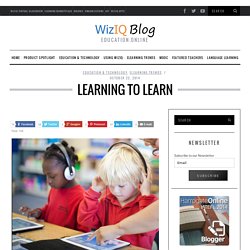
As we get older, we have less time to reflect about the learning process. Developing new habits become difficult. The role of metacognition in language learning. According to Vandergrift and Goh (2o12:loc 360), “metacognition, or the act of thinking about thinking, refers to the ability of learners to control their thoughts and to regulate their own learning.”
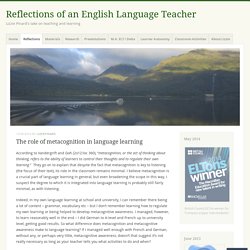
They go on to explain that despite the fact that metacognition is key to listening (the focus of their text), its role in the classroom remains minimal. My top ten learner autonomy and metacognition resources. Are you interested in the prickly issue of learner autonomy?
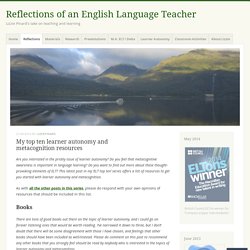
Do you feel that metacognitive awareness is important in language learning? Do you want to find out more about these thought-provoking elements of ELT? This latest post in my ‘ELT top ten’ series offers a list of resources to get you started with learner autonomy and metacognition. As with all the other posts in this series, please do respond with your own opinions of resources that should be included in this list.
There are tons of good books out there on the topic of learner autonomy, and I could go on forever listening ones that would be worth reading. Phil Benson: Teaching and Researching Autonomy. An Effective Five-Minute Lesson On Metacognition. I often write about helping students exercise, and be aware of, metacognition (see Another Lesson Combining Metacognition, Writing, Speaking, & Listening) and include extensive lesson plans about it in my latest book.

Today, I did a five-minute unplanned lesson on metacognition that I believe was extraordinarily effective. We were looking at writing “hooks” — openings for their biographical essays on either George Washington or Ben Franklin — and comparing several examples of good and bad ones. Students were to work in pairs and choose the best ones and write a one sentence explanation of why they thought it was better. Prior to their beginning the activity, and after I had modeled it, I introduced the word “metacognition” as part of an explanation of why I wanted them to write their reasons. I crunched-up another sheet of paper, threw it, and it landed just short, hitting the rim of the can (again, great cheers from the class).
The Best Posts On Metacognition. Helping students strengthen their understanding of metacognition — thinking about their thinking — is an important goal of my teaching.
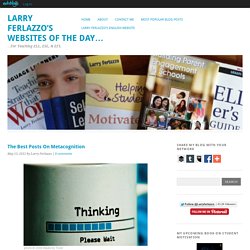
And I’ve written a lot about it. I thought it would be helpful to gather all of those posts in one “The Best…” list. Here are My Best Posts On Metacognition: How People Learn:Bridging Research and Practice is a new book from The National Academy Of Sciences and can be read for free online. It focuses on three teaching strategies — activating prior knowledge, focusing on big concept ideas and encouraging pattern recognition, and developing awareness of metacognition. Do Students Know Enough Smart Learning Strategies? Metacognition and Student Learning is from The Chronicle on Higher Education. Bringing Metacognition into the Classroom is by Lizzie Pinard. The Importance Of Explaining “Why” Three Good Resources On Metacognition. Zenandtheactofteaching.pdf. Summary of the 26.02.2014 #ELTChinwag on Metacognitive Skills.
For those not in the know, ELTChinwag discussions, organised by ELT Ireland, take place on Twitter twice a month on Mondays at 20.30pm GMT, under the hashtag #ELTChinwag.
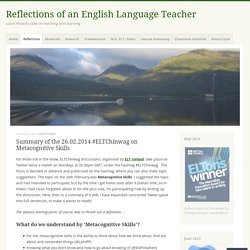
The focus is decided in advance and publicised on the hashtag, where you can also make topic suggestions. The topic on the 26th February was Metacognitive Skills. I suggested the topic and had intended to participate, but by the time I got home soon after 9 (Italian time, so in time!) I had clean forgotten about it! On the plus side, I’m participating now by writing up the discussion. The obvious starting point, of course, was to thrash out a definition… What do we understand by ‘Metacognitive Skills’? For me, metacognitive skills is the ability to think about how we think about, find out about and remember things (@LahiffP)Knowing what you don’t know and how to go about knowing it?
This raised another question. Metacognition: The Gift That Keeps Giving. Editor's note: This post is co-authored by Marcus Conyers who, with Donna Wilson, is co-developer of the M.S. and Ed.S.
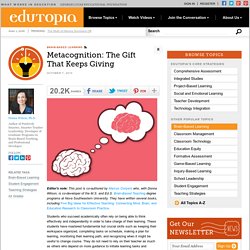
Brain-Based Teaching degree programs at Nova Southeastern University. They have written several books, including Five Big Ideas for Effective Teaching: Connecting Mind, Brain, and Education Research to Classroom Practice. Students who succeed academically often rely on being able to think effectively and independently in order to take charge of their learning. These students have mastered fundamental but crucial skills such as keeping their workspace organized, completing tasks on schedule, making a plan for learning, monitoring their learning path, and recognizing when it might be useful to change course.
They do not need to rely on their teacher as much as others who depend on more guidance to initiate learning tasks and monitor their progress. Metacognition in the Brain How to Teach Students to Be More Metacognitive Reference Stephen M. For Further Reading.